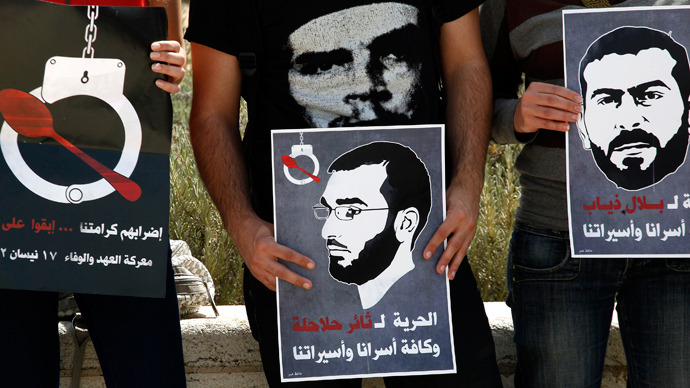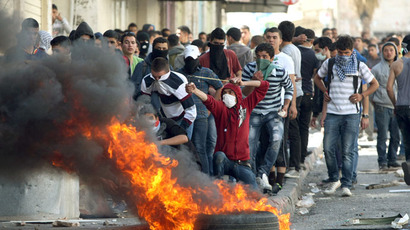Take 2: Israel ‘rearrests’ former Palestinian hunger striker

Former Palestinian prisoner Thaer Halahla, who was held without charge by Israel for nearly two years until last June, has been rearrested in Ramallah, an official in the Palestinian Authority's ministry for prisoners' affairs told AFP.
Witnesses told Ma'an news agency that Israeli soldiers raided
Halahla's home and a neighboring residence in Ramallah, damaging
his belongings and confiscating his mobile phone. His wife fainted
during the arrest, and was taken to hospital.
The 35-year-old Halahla, from the Hebron district town of Kharas,
was released in June after a 76-day hunger strike in protest
against his detention without charge and conditions in Israeli
prisons. According to AFP, Halahla was one of over 1,500 prisoners
who went on a hunger strike for different lengths of time until May
14, 2012, when a deal was struck with Israeli authorities to
improve prison conditions.
The Israeli Prison Service freed him near the Beit Seera checkpoint
in western Ramallah, where he was met by crowds of supporters
celebrating his return. Halahla agreed to the deal with prison
authorities in mid-May last year in exchange for his release at the
end of his current administrative detention term, according to
Ma’an news agency.
Halahla told his gathered supporters that his fellow hunger-striker
Bilal Diab had been close to death at the moment of their strike,
saying that people like him "would never kneel before
occupation, as the [Israeli] occupation fears the strong will of
Palestinian prisoners.”
Israel’s administrative detention act makes it possible to imprison
suspects without trial by order of a military court; such orders
can be renewed indefinitely for up to six months at a time.
The Montreal-based Center for Research on Globalization slammed
Israel’s treatment of Palestinian prisoners in a report issued on
April 6: “Israel is arguably exempt from strong condemnation
over its treatment of the Palestinian people as a result of certain
international human rights organizations’ ability to ignore Israeli
violations against the Palestinians.”
Earlier this month, riots swept across the West Bank and Gaza
following the April 2 death of a Palestinian prisoner in an Israeli
jail.
Maysara Abu Hamdiyeh, 64, had reportedly been refused release for
medical treatment. His family claimed he had complained about his
health since the summer of last year. It was only in March when he
was diagnosed with terminal cancer that prison authorities finally
allowed him to be treated in hospital, where he died a week
later.
According to Haaretz, Hamdiyeh had been serving a life sentence
since 2002 for attempted murder, membership in Hamas and weapons
possession. His enraged supporters blamed Israel for the elderly
prisoner’s death; over 4,000 Palestinian inmates went on hunger
strike to show their anger at his demise.
Palestinian Authority President Mahmoud Abbas declared that Israel
was responsible for deterioration of his health, but his
accusations were dismissed.
"The Palestinian detainees imprisoned in Israel receive
excellent medical attention and are visited by the Red Cross,
whereas inmates in [Palestinian Authority] prisons receive
nothing," Ofir Gendelman, a spokesperson for Prime Minister
Benjamin Netanyahu said, according to Haaretz.
Hamdiyeh’s death is the second Palestinian to die in an Israeli
jail this year. Arafat Jaradat, 30, passed away after a heart
attack in February, while Palestinian authorities claimed he died
after being tortured, citing autopsy results. Jaradat’s funeral
also drew thousands of Palestinian demonstrators, who clashed with
Israeli police.














